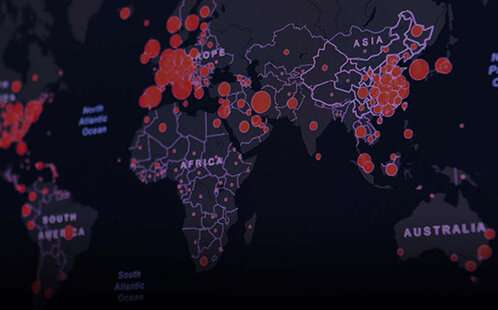Credit: Western Sydney University
Researchers from Western Sydney University's Humanitarian and Development Research Initiative (HADRI) have used international research linkages to produce a new report on government responses to the COVID-19 pandemic as it spread across the globe.
The report, "The State Responses to COVID-19: a global snapshot at 1 June 2020," was edited by HADRI Director, Associate Professor Nichole Georgeou, and HADRI Adjunct, Dr. Charles Hawksley of University of Wollongong. It features a compilation of analyses and case studies from 70 regional experts.
Associate Professor Georgeou said the report provides valuable insights into the health, social, political and economic responses to the pandemic, as well as the impacts on vulnerable groups across 43 states and territories at 1 June 2020.
"The report contrasts the decisions of individual states and builds a collective understanding of how governments chose to address and prepare for the crisis. From testing and isolation, through to economic stimulus and education, there are many lessons to be learnt," said Associate Professor Georgeou.
"Some of the broader trends relate to the idea of community resilience and the role people played in supporting and protecting each other. We also note early adaptors generally fared better, with some states more proficient in locking down, mobilising healthcare, and utilising technology. Many vulnerable people world-wide have been left exposed."
According to Dr. Hawksley, Australia benefitted from having the time to observe other states in various stages of management and crisis: "Initial modelling predicted that a "do nothing" approach would result in around 150,000 dead, and no government was prepared to accept that cost. The Federal government followed science, listened to experts and issued accurate statistics daily."
Dr. Gordon Nanau from the University of the South Pacific noted that neighbouring Pacific Island countries were still recovering from the 2019 measles outbreak when COVID-19 arrived.
"Experiences with measles testing, nation-wide vaccinations and contact tracing became valuable skills during the COVID-19 response. In both instances, decisive and determined leadership by national frontline agencies became critical in containment efforts," said Dr. Nanau.
"Political leadership aided by social cohesion and social capital through Melanesian, Micronesian and Polynesian social systems—the wantok system, Fa'a Samoa, Faka Tonga, and other networks across Oceania—mitigated potential livelihood disasters during the pandemic."
Professor James Arvanitakis, Western Sydney University's Institute for Culture and Society, and Dr. Jason McConnell, University of Wyoming, suggest the United States of America's response to the pandemic was more complex than the headlines suggested, with politics often overwhelming policy.
"Since a brief moment of bipartisanship, everything about the virus has become partisan in the US. In such a large and diverse nation, what is evident is that any response required a localised approach to garner buy-in from the people," said Professor Arvanitakis.
"For a complex set of reasons including, pre-existing health and socio-economic conditions make the coronavirus particularly deadly for African Americans. Likewise, the pandemic is exacerbating existing vulnerabilities in First Nations communities."
Provided by Western Sydney University
























